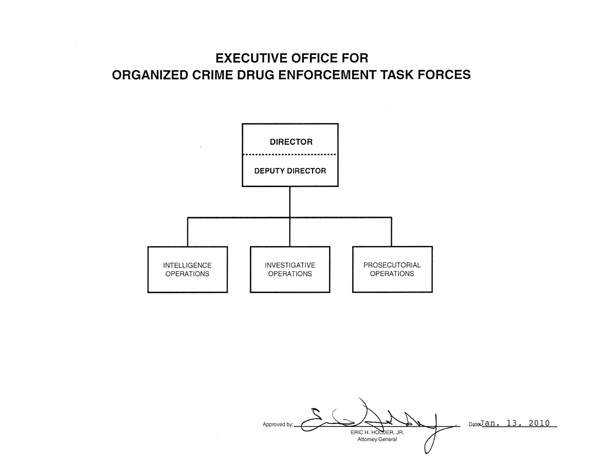 d
dThe Organized Crime Drug Enforcement Task Forces (OCDETF) Program was established in 1982 as a multi-agency, nationwide effort to pursue comprehensive, intelligence-driven, multi-jurisdictional investigations of major drug trafficking and money laundering organizations. On January 13, 2010, Attorney General Eric H. Holder, Jr. approved a reorganization that established OCDETF as an independent component in the Department of Justice reporting directly to the Deputy Attorney General. The OCDETF Program forms the centerpiece of the DOJ counternarcotics strategy, and uses prosecutor-led, multi-agency task forces to combat the most serious drug cartels.
The mission of the OCDETF Program is to reduce the supply of illegal drugs in the United States and diminish the violence and other criminal activity associated with the drug trade. To accomplish this mission, OCDETF combines the resources and expertise of its seven federal law enforcement agency members – the Drug Enforcement Administration (DEA); the Federal Bureau of Investigation (FBI); the Bureau of Alcohol, Tobacco, Firearms and Explosives (ATF); the U.S. Marshals Service (USMS); the Internal Revenue Service (IRS); the U.S. Immigration and Customs Enforcement (ICE); and the U.S. Coast Guard (USCG). The integrated involvement of attorneys from the 94 U.S. Attorneys’ Offices and the Department of Justice’s Criminal Division ensures that OCDETF prosecutions are well-prepared, comprehensively charged, and expertly handled.
The major functions of the OCDETF Program are to:
The Executive Office for OCDETF is responsible for establishing program policy and guidelines and ensuring that those policies and guidelines are implemented in the nine OCDETF geographic regions. The Executive Office monitors OCDETF activities nationwide, resolving any program or policy issues that arise, and provides policy and performance information to the Attorney General and the Deputy Attorney General. The OCDETF Executive Office also supports headquarters and field OCDETF activities by serving as a clearinghouse for OCDETF issues and information, by collecting and maintaining OCDETF performance statistics submitted from the field, by coordinating efforts and arbitrating disputes among components or geographic subdivisions, and by preparing and managing OCDETF funding to support the priorities and initiatives of the Program.